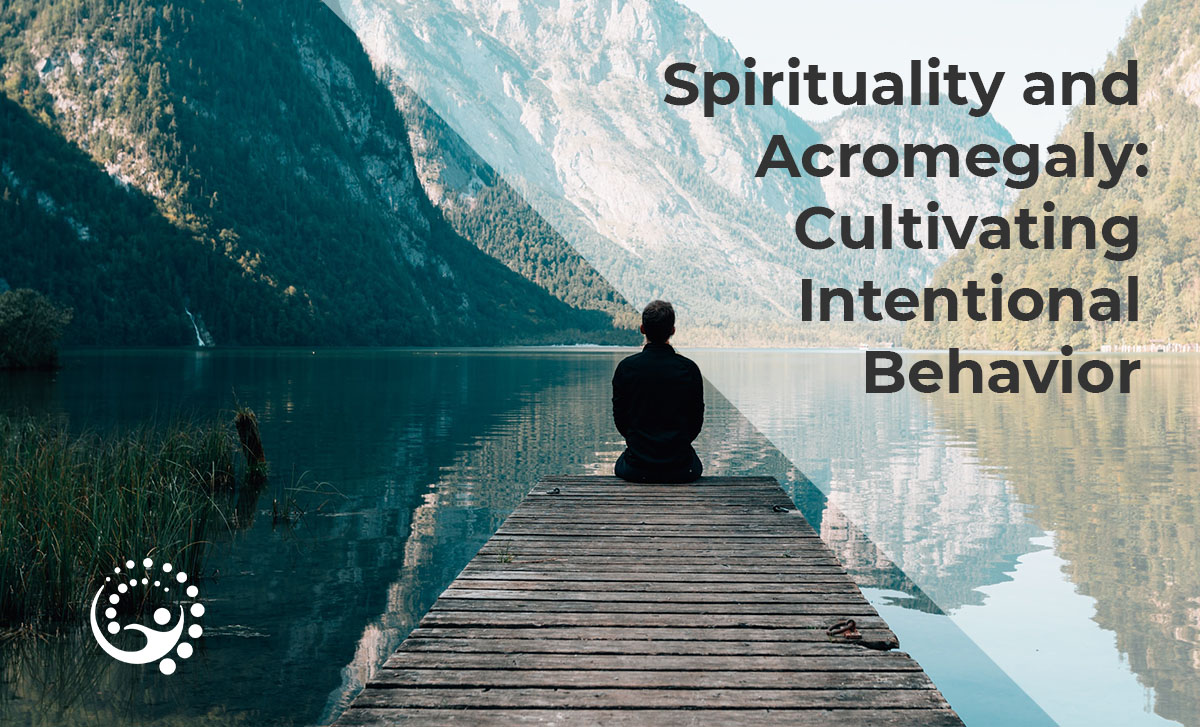In our last blog, we talked about how there are as many ways to practice spirituality as there are people who practice it. We also talked about ways people with acromegaly might benefit from incorporating some kind of spiritual practice into their lives. In this post, we’ll explore how intentional behavior can help enhance your connection to the world around you and enable you to be more present as you move through life as a person with a rare disease.
Intentional behavior refers to “goal-oriented behavior in which an individual uses strategies to achieve various ends or effects.” This way of thinking can enhance your spirituality in all aspects of your life by challenging you to be present in mind and act with purpose or intention. This kind of behavior can also make you less reactive to the things happening around you or to you, a helpful skill for someone living with acromegaly where so much can be out of your control.
Let’s look at some ways that intentional behavior can help you learn how to live and act with purpose and better navigate living with a rare disease such as acromegaly:
- Releasing judgment: Avoid assuming someone’s character or something’s value based simply on initial impressions. This behavior can free you from being judgmental and having unmet expectations. For instance, if people constantly disappoint you with their comments on your physical appearance or ask too many questions about acromegaly, practice releasing your expectations about how they should behave and meet them with an open mind.
- Performing regular acts of compassion: Being compassionate or “willing to suffer together” opens your heart up to others who are in need, and creates meaningful connections that can help support you through difficult moments. It can also be beneficial for your physical and emotional health.
- Letting go: When we let go, we release tension, create ease, and clear a path for our true nature to shine. Examples of letting go include accepting change (such as a rare disease diagnosis or changing your daily routine), not being attached to outcomes, surrendering desires, and relinquishing the ego.
“What I do when I’m having a bad day is I try to let it pass through me. I try not to hold on to the pain or the disappointments or the frustrations. I try to let go because letting go makes me stronger. In order to be stronger, I have to let go of the concept of strength.
-Shawn Atchley, D.Min, M.Div, MSW and acromegaly patient
- Practice gratitude: Many people start and end their day with gratitude. Gratitude fosters perspective and can brighten our mood and remind us of what is working in our lives. A gratitude journal may be your style, or perhaps you make mental notes of what you’re grateful for throughout the day.
- Make affirmations: If the idea of looking yourself in the mirror and saying “I am strong” makes you cringe, hear us out. Repeating daily affirmations can ground us in who we are, what we’re doing in this life, help us set goals and achieve them, and strengthen self-love. This behavior can talk directly to the negative inner voice many of us have, telling us we’re “less than,” especially if you’re experiencing a rough bout of headaches, fatigue, changes in your appearance, or other acromegaly symptoms. Affirmations remind us that we are tough, and they can strengthen our sense of identity even as we’re dealing with difficult changes. You can also say them wherever they feel best to you: in your car, in the mirror, or while you’re preparing dinner.
- Unplug: Technology can quickly pile on the stress. From nonstop texts to nonstop documentation of our lives on social media, putting our devices aside for a certain amount of time every day or every week can help us reclaim our time and minds. Taking a tech hiatus limits distractions and focuses you on the present moment, helping you become more mindful and allowing you to engage more fully in your surroundings. Check out this post for tips on detaching yourself from your devices.
- Think positively: Living from a place where the glass is always half-full helps you become more relaxed in the face of difficult moments. Positive thinking also gives you a more optimistic perspective on the world and other people, making it easier to establish those connections we all seek.
Seek Spirituality Support
Some people might feel ready to dive into their spiritual practices, while others may feel hesitant and want more guidance. Spirituality therapy is a relatively new approach to therapy that focuses on applying spirituality to an individual’s day-to-day life. Spirituality therapists can help people find balance, reconnect with a higher power (whether that be God, the universe, or nature), and deal with crises of faith.2
Some people reach out to a spirituality therapist to develop their own ethical code. Others may want to resolve disagreements within their belief system, establish or re-establish meaning and purpose in life, and find inner peace.1
Whatever the reason for seeking the help of a spiritual therapist, this type of therapy may help raise your awareness of the universe, enhance your connection to it, and attain a feeling of harmony within it.2
To incorporate intentional behaviors into your daily life, you need a plan. This downloadable resource will help you develop a customized action plan as to how you will integrate intentional behaviors into your days. For more details on spirituality and its impact, you can also read the full article, “Exploring Spirituality With A Rare Disease: The Universe and You.”
Fundamentally, spirituality is about connecting to ourselves, the universe, nature, each other, and the lifelong search for ways to live our lives as best as we can. There is no finish line to your spiritual journey, the journey itself is the reward, and it can be fun if you let it! Think about all the opportunities for learning, self-exploration, and connection. Plus, you may even inspire others to embark on their own spiritual journey, which is a pretty amazing thought.
“Most of the people I know who have what I want — which is to say, purpose, heart, balance, gratitude, joy — are people with a deep sense of spirituality.”
–Anne Lamott, Traveling Mercies
Exercises
Was this information helpful to you? If so, please share with others and subscribe to receive the latest content.
HELPFUL TOOLS AND RESOURCES
Mayo Clinic: Positive thinking: Stop negative self-talk to reduce stress
James Clear: Habit Building and Positive Thinking
Chronic Illness, Spirituality, and Healing: Diverse Disciplinary, Religious, and Cultural Perspectives. Edited by Michael J. Stoltzfus, Rebecca Green, and Darla Schumm.
REFERENCES
- Jenna Jarrold, MS, LAC, NCC. Spirituality Therapy. TherapyTribe.com, June 4, 2019.
- Spiritual Support. GoodTherapy.com. 11-27-2018.




